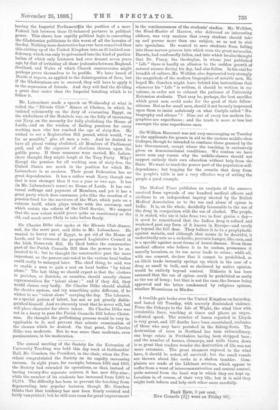Sir Charles Dille also spoke at the Eleusis Club dinner,
and, for the most part, said ditto to Mr. Labouchere. He wanted to hurry out of Egypt, to get rid of the House of Lords, and he censured the proposed Legislative Council in the Irish Home-rule Bill. He liked better the constructive part of the Parish Councils Bill than the powers to be en- trusted to it ; but he thought the constructive part the more important, as the powers entrusted to the various local bodies could easily be enlarged later. The chief thing, he said, was to enable a man to gain a seat on local bodies " by talent alone." The last thing we should expect is that the electors in parishes, or districts, or counties, should usually choose representatives for " talent alone ; " and if they did, they would choose very badly. Sir Charles Dilke should abolish the elective system, and try something quite different, if he wishes to see "talent alone" carrying the day. The labourer, as a special patron of talent, has not as yet greatly distin- guished himself. And we sincerely trust that he never will, but will place character far above talent. Sir Charles Dilke was not in a hurry to pass the Parish Councils Bill before Christ- mas. He thought the guillotining process would be very in- applicable to it, and prevent that minute examination of the clauses which he desired. On that point, Sir Charles Dilke was moderate. But he was more than moderate, even parsimonious, in his moderation.






































 Previous page
Previous page